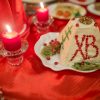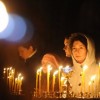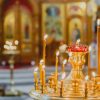Saint Paisios of Mt. Athos walked his occult-dabbling guest down the path leading away from his cell. Suddenly a bush nearby began to shake violently. There was no wind or other physical cause; the bush was being shaken by a demon. “Don’t be afraid of him,” Saint Paisios assured his guest, “that’s all he can do.”
In Africa, Elder Cosmas, Apostle to Zaire, was called to the police station to give advice on the handling of a witch who had flown into the region on a broom that used the blood of infants as fuel. In his many encounters with voodoo and demonic influences, one thing was consistent: The demons and witch-doctors had no power in his presence.
When the demon of fornication (a sacramental rite in paganism) visibly con-fronted Saint Joseph the Hesychast, he struck it on the back and it vanished. He noted later that he had felt coarse hair on its back, like a pig’s, and the contact had made his hand stink like sulfur.
Back in the second century, Saint Clement of Alexandria, who dialogued extensively with pagans and had intimate knowledge of their rituals and supernatural conjurings (e.g. an ear of wheat growing and maturing with a supernatural suddenness, unexplainable lights, possession by “deities,” etc.) explains in great detail his conclusion that “your gods are inhuman and man-hating demons, who not only exult over the insanity of men, but go so far as to enjoy human slaughter.” (Exhortation to Pagans)
In the Book of Needs, the four-volume set of services Orthodox clerics use on occasions outside of worship, are listed: “A Supplicatory Service for Them That are Afflicted, Being Assailed and Oppressed by Unclean Spirits”; “A Prayer of Interdiction of St. Basil the Great, Over One Suffering from Demons”; and “A Prayer for a Home Troubled by Evil Spirits.” Likewise, it is the spiritual tradition of the Church that the hours between midnight and 3 a.m. are the most active for demons (in mockery of 3 p.m., the hour of Christ’s crucifixion), and in the monastic setting these are hours of watchfulness and prayer.
Therefore, it should be obvious that the existence of demons (fallen angels), and their potential influence, is assumed to be true by all Orthodox Christian believers. Evil cannot be explained away as “negativity” or “darkness that balances the light” or “a metaphor for the lack of goodness.” Evil is the activity of Satan and the demons who cooperate with him in a vain attempt to resist the omnipotent love of God.
Orthodox Christians do not fear Satan or any of the demons; we stand in awe of God alone. Having been given the grace of baptism and introduced to the knowledge of the spiritual life, we are protected from demonic influence by the sacraments, and to the degree that we wisely avoid extending an invitation to it. Fear, entertaining sinful thoughts and actions, along with failing to embrace repentance, creates opportunities for demonic influence.
Yet there is nothing that opens the door to demonic influence faster than dabbling in rituals established specifically for demonic encounters (i.e. circles of power, séances, Ouija boards, etc.). Predating Christianity is the pagan rite of the dromenon, the invitation to be possessed that exists in every authentic pagan rite, whether ancient or modern. In essence, Orthodox Christianity respects the spiritual reality behind the pagan rituals regardless of the practitioner’s own spiritual understanding.
Halloween, the feast of Samhain, is in fact one of the great feasts of paganism and Satanism. Fruit, animals, and humans are sacrificed every year on this day. The word samhain is Gaelic for “summer’s end,” the end of the harvest and the beginning of nature’s cycle from death (fall) to rebirth (spring). The word “Halloween” is derived from “hallowed evening,” for, among Western Christians, it is the eve of the feast of All Saints.
By children, Halloween should be approached in simple obedience to their parents and without comparing their own practice with that of their friends who differ. Parents, on the other hand, should be consciously discerning about the activities and attitude that various celebratory customs may include or cultivate. To dress up our children as zombies (or worse) and send them off to participate in unsupervised evening activities is no more wise on Halloween than it would be on any other day of the year. Parents should supervise their children on this day with the same diligence and spiritual vigilance they practice year round.
We do know, however, that Halloween is a culturally accepted evening of looseness, violence, and vandalism. Even if no one is intentionally celebrating a pagan feast, that does not ensure protection from the demonic influence that is always looking for an invitation.
We are not to be a fearful or judgmental people. We are to be wise as a serpent and gentle as a dove. “All things are lawful for me,” says St. Paul, “but not all things are beneficial. All things are lawful for me, but I will not be subject to any of them.” The scariest thing about Halloween is that it may be the only day of the year that we contemplate the spiritual reality that surrounds us everywhere and all the time.
In the struggle with all of you,
Fr. Thaddaeus

















